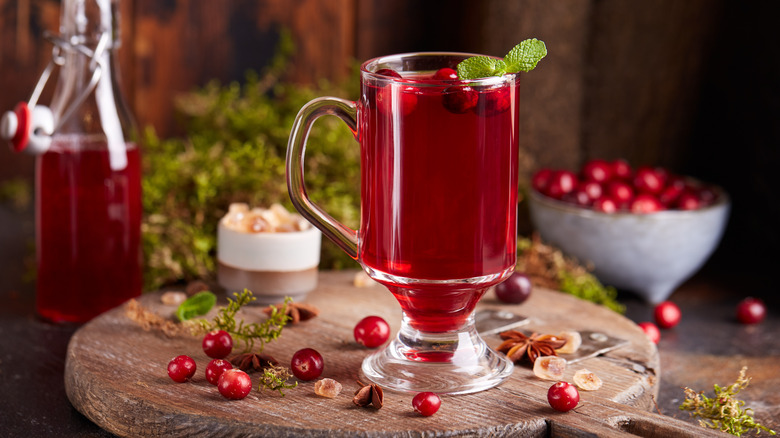Is Cranberry Juice Actually Good For You?
Rich in vitamins and antioxidants, cranberry juice is considered a natural remedy for inflammation, digestive problems, and urinary tract infections (UTIs). Proponents say that it also supports heart health and fights oxidative stress. For example, evidence shows that it may reduce bacterial populations in the bladder and help treat UTIs, according to a 2017 review published in Frontiers in Microbiology. As the researchers note, this beverage has antibacterial, antiviral, and antifungal properties. On top of that, it's refreshing and low in calories.
A cup of cranberry juice boasts 116 calories and over 25% of the daily recommended vitamin C intake, plus large doses of vitamin E, vitamin K, vitamin B6, and copper (via My Food Data). But you'll also get a whopping 31 grams of sugar.
This brings up the question, is cranberry juice good for you? Does it really prevent UTIs and other health problems? The answer depends on who you ask. For every study that supports its benefits, there is another study claiming the opposite.
Does cranberry juice have any health benefits?
Anecdotal evidence says that cranberry juice may prevent and treat UTIs, a condition affecting millions of people worldwide. Medscape reports that 25 to 40% of American women aged 20 to 40 years have experienced this problem. Some studies indicate that cranberries and their juice may help with UTIs, but there isn't enough evidence to confirm these claims. "The data on cranberry juice and cranberry supplements with regard to urinary tract infections is inconsistent," Dr. Pamela J. Levin told Penn Medicine. She also points out that "there isn't sufficient data to determine the duration of therapy or the dose of cranberry necessary to achieve [this] effect."
Leaving these aspects aside, cranberry juice is rich in bioactive compounds that support overall health. Vitamin C, one of the most abundant nutrients in cranberries, protects your cells against oxidative stress and aids in iron absorption. Moreover, it may reduce the risk of developing cataracts and slow the progression of certain eye diseases, explains the Mayo Clinic.
There's also evidence that cranberry juice may improve heart health, but further research is needed to confirm these findings. For example, a 2018 study published in the European Journal of Nutrition suggests that drinking this beverage daily can increase good cholesterol levels, enhance your antioxidant status, and reduce heart disease risk in just eight weeks. Scientists say that cranberry juice can improve glycemic control and lipid metabolism, too. These beneficial effects may be due to its high antioxidant content.
Potential side effects of cranberry juice
Despite its high nutritional value, cranberry juice isn't the healthiest choice. For starters, it's low in fiber and high in sugar. "Fruit juice has most of the fiber removed," explained registered nutritionist Emma Elvin in an interview with the BBC. As a result, the sugar goes straight to your bloodstream, which can lead to diabetes and other metabolic disorders in the long run. The fiber in whole fruit promotes satiety and slows sugar absorption into your system. That's why most nutritionists recommend eating fresh or frozen cranberries and other fruits rather than drinking their juice.
When consumed in excess, this beverage may also cause digestive distress and put you at risk for kidney stones, warns WebMD. Plus, it may interact with blood thinners, statins, diclofenac, tamoxifen, ibuprofen, and other medications. Cranberries and their juice can affect your body's ability to break down these drugs and increase their side effects.
All in all, there's nothing wrong with drinking a cup of cranberry juice every now and then. Just don't expect it to cure your UTI or slow down aging. What matters most is your overall diet. This beverage packs a hefty nutritional punch, but it's by no means a miracle cure. Enjoy it in moderation — or better yet, eat fresh cranberries to fully reap the benefits.



